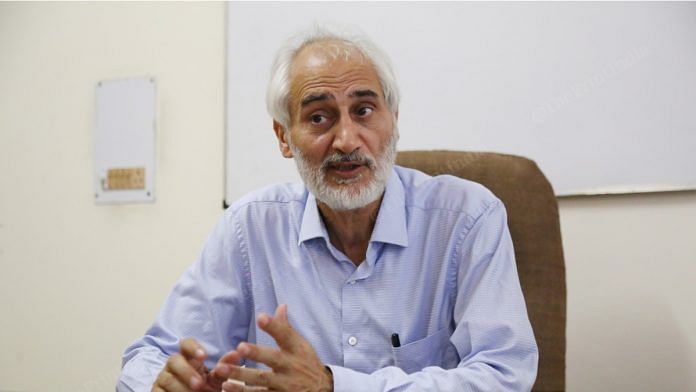Ludhiana: The well-being of small peasants, crop diversification, and a new set of farm policies are some of the aspects of agriculture that eminent agro-economist Sukhpal Singh wants to pursue in his new role as chairman of the Punjab State Farmers’ Commission.
In an interview with ThePrint after assuming charge on 12 September, Singh said that the commission would work on policy reforms, and added that his vision is to give farmers the maximum benefits, which wasn’t the case with the Centre’s repealed farm laws.
“We feel that in the previous regime, farmers were excluded. Our vision is that we develop a policy that caters to the needs of farmers — small ones in particular who are a victim of the whole economic set-up. They are leaving farming, are debt-stressed and dying by suicide. The repealed laws catered to the needs of corporations. We will aspire to keep farmers at the centre in the new set of reforms,” he said.
As many as 32 farmer unions from Punjab along with their counterparts from neighbouring Haryana and Uttar Pradesh were at the forefront of the protests against the now junked central laws. In November last year, the Narendra Modi government had announced that the laws enacted in 2019 were being repealed.
Sukhpal said the commission might work on a set of reforms that would focus on farmers, including small and marginal ones.
“There is a need to develop a cropping pattern. There is a need to develop a marketing system. There is a need to boost trade, both domestic and international. Certainly there is a need for reforms in the agrarian economy, marketing and production in particular. But reforms should be in favour of the farmers,” he asserted.
Also Read: With MSP procurement for first time, ‘tricky’ moong spells good gains in Punjab mandis
Increasing farm and farm labour incomes
The new chairman highlighted the extent of the debt that has gripped the farming community in Punjab. “Almost 89 per cent of Punjab’s farmers are indebted, including those who own more than 25 acres of land. The average debt of a farmer is Rs 10 lakh per household and their annual income on average is just Rs 6 lakh. The debt servicing capacity of about one-third of the farmers is nearly zero. They can’t even pay interest on loans.”
Singh cited two possible ways in which this burden can be reduced — enhancing incomes of both farmers and farm workers, and offering debt waivers in some cases.
He also cited ways to enhance farmers’ incomes. “One is that we can introduce new crops which offer higher yield, productivity, and the other is changing the marketing strategy,” he said, adding that experts could come up with a plan to grow crops according to agro-climatic conditions.
“We can develop a different set of cropping patterns in border areas, in central and southern Punjab. In a cluster approach based on agro-climatic conditions, we can introduce different sequences of cropping, yield, marketing, productivity etc. So we will develop different policies depending on the needs of different regions.”
As for farm labourers, Singh stressed that agricultural employment in Punjab was mostly seasonal and not permanent. He suggested building agro-processing industries in rural areas and opting for labour intensive farming to enhance income of farmers.
“We are thinking of developing a policy or a scheme for increasing the income of farmers and farm labourers. In farming, employment of workers is continually declining. It could be increased by labour intensive cropping. We will also have to develop agro-based and processing industries in rural areas which can provide more jobs,” he added.
‘Open international trade’
In the initial months of the Russia-Ukraine war that began in February, wheat prices had gone up globally as supplies from both countries were disrupted.
Farmers from Punjab and other wheat-growing states sold their produce in the open market as the prices were higher than the minimum support price (MSP) offered to them. The boom in private trading was short-lived as the government banned wheat export in May to control spiraling prices after a near dry summer and to ensure food security.
Asked whether Indian farmers could meet the demands of global markets, Singh asserted that India should start first with its neighbours. “Export-import policy comes under the provision of the central government and not the state’s. We have enough food grains. We can export the excess to Afghanistan, Pakistan and other bordering countries.”
Not just food grains, opening trade with bordering countries will provide good returns and incomes to farmers who cultivate fruits and vegetables as well, Singh said. “There are some exceptional cases when the central government decides to ban export, but otherwise international trade does benefit the farmers.”
(Edited by Tony Rai)
Also Read: Inertia or economics? Why Punjab’s farmers can’t move beyond rice and wheat



